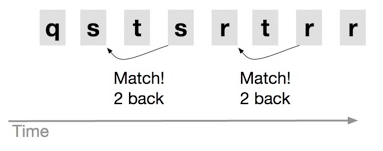Can software make you more intelligent?
A recent article in Wired magazine claims that researchers have found out a guaranteed method to improve your intelligence. Sounds wonderful! But does it stand up to scrutiny?
The research they discuss is about the so-called "n-back test" which is used to examine how effectively someone can use their short-term memory. As with many tests, the more you do it the better you get — hopefully! So what is the "n-back test"?
**The n-back test
If you try an n-back test, you will be asked to remember a stream of items. These might be visual elements such as shapes or colours, or auditory elements such as sounds or words, and so on. To test your memory, you are asked to say when items match. Sounds like a game of snap! But there's a twist: rather than spot when two sequential items match (as in snap) you must say when the current item matched not the previous one, but the one before that. In other words: two items back. Here's a diagram of the two back test using letters:

Harder versions of the test would involve matching three items back, four items back, and so on. Hence n-back, where "n" is any number.
**Dual n-back
So far so good. But instead of matching just a letter to the letter two items previously, imagine matching a letter and a colour. Or a sound and a shape. Performing two tasks simultaneously is known as the "dual n-back" test, and is seriously tricky!
It has been discovered that repeated training on this test improves performance, and this type of ability is core to what is known as "fluid intelligence". Previously it has been thought that fluid intelligence is fixed, but the researchers in the article state that performing the n-back test leads to improvements in other tests of memory and intelligence.
This transference of ability from one test to a completely different test is key. Such transference has proved incredibly elusive, so this is a potentially very exciting development. People can improve performance at various types of memory tests, but those improvements typically remain within the small domain of the specific test. Transference outside the limited scope of the test is something of a Holy Grail for memory researchers, hence the excitement around this particular research.
**Brain training
Brain training software is a hot topic, with Nintendo's Brain Age and Lumosity's software purporting to improve your intelligence in various ways. Researchers and scientists have been very sceptical of these claims, and they remain controversial.
N-back training could hold the key to developing effective brain training software. More research is needed, but this is a very promising start.
**Your memory and you
Patients often talk to me about the stresses and strains of their lives, and we frequently discuss how this may influence the aches and pains they experience. Among patients in their 40s and 50s, many talk about how their memory isn't what it used to be. This might manifest as misplacing a set of keys, or finding work less fun and more of an effort. Stress (or more accurately "distress") is often a significant contributing factor in physical discomfort, so anything that can improve our ability to handle it can help with other symptoms. If you're concerned about your memory then talk to your GP, and be sure to mention it in your osteopathy appointment. Don't spend oodles of cash on tenuous apps and other software that purport to make your brain younger — there's very little convincing evidence that they work! But perhaps you could try the n-back test every day for a month and see how you get on!